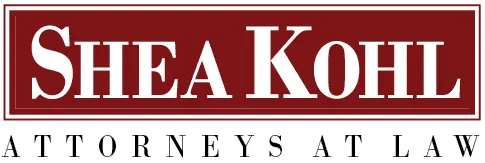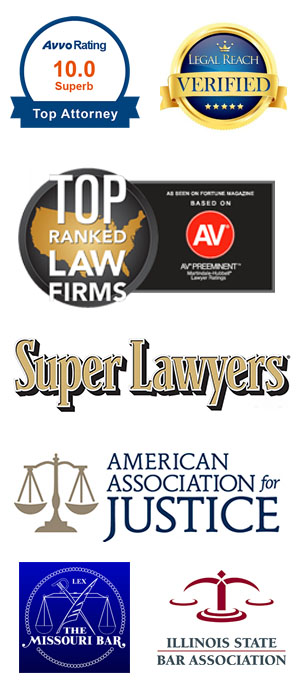Experienced Trial Lawyers
More Than 100 Years Of Combined Experience On Your Side

What is the Negligence Law in Missouri Regarding Premises Liability in a Walmart Slip and Fall Case?

The answer lies in the realm of premises liability law, specifically the concept of negligence. In Missouri, businesses like Walmart have a legal duty to maintain their premises in a reasonably safe condition for customers. When they fail to uphold this duty, they can be held liable for any resulting injuries.
Here’s an easy-to-understand guide about Missouri’s premises liability law, and how it can be relevant to your situation. For legal help in your specific case, please reach out to us at Shea Kohl Law.
Understanding Negligence in Premises Liability Cases
“Premises liability” is the legal concept that holds property owners responsible for keeping their premises reasonably safe for visitors. Property owners or managers must either eliminate hazards on their premises, or adequately warn guests of those hazards. Failure to do so may mean that the owner or manager was negligent.
Important Factors in a Walmart Premises Liability Claim
For an effective and watertight premises liability claim, you’ll want to work with an experienced attorney to ensure that you can establish these factors:
Walmart’s Negligence
Walmart may be found negligent and held responsible if they failed to maintain a safe environment for customers. Examples are failing to promptly clean up spills, not fixing tripping hazards, or failing to provide warning signs for potential dangers.
To establish negligence in a slip-and-fall case against Walmart, you must prove the following elements:
- Duty of care: Walmart, as a business owner, has a duty to exercise reasonable care in maintaining the safety of their premises for customers. A common example of this duty is wiping away any liquid spills on the floor and putting up warning signs.
- Breach of duty: Walmart breached this duty by failing to address a hazardous condition, such as by failing to wipe the spilled liquid that caused your fall.
- Causation: Your injuries were directly caused by Walmart’s breach of duty.
- Damages: Your injuries resulted in measurable losses, including medical costs, missed income, or pain and suffering.
Note that the mere existence of a dangerous condition on Walmart’s premises does not automatically establish negligence. A key factor is whether Walmart had actual or constructive knowledge of the hazard and failed to take reasonable steps to address it.
Knowledge of the Dangerous Condition
For Walmart to be held liable, they must have reasonably known of the hazardous condition that caused your fall. This knowledge can be either actual or constructive.
- Actual notice: Walmart had direct knowledge of the hazard – for instance, if an employee witnessed a spill but failed to clean it up or warn customers.
- Constructive notice: The hazardous condition existed for a sufficient period that Walmart should have discovered and addressed it through reasonable inspection and maintenance procedures. Even if no employee was directly aware of the specific hazard, if it had existed for a long time, the property owner may be legally responsible for it.
Foreseeability
Walmart may be responsible if the hazardous condition that caused your fall was reasonably foreseeable. If Walmart could have predicted that a particular danger might cause harm to customers, they had a duty to take steps to prevent such accidents from occurring.
Proximate Cause
To hold Walmart liable, the hazardous condition on their premises must be the direct and proximate cause of your fall and resulting injuries. If your injuries were caused by an unrelated factor or your own negligence, Walmart may avoid responsibility.
Comparative Negligence (Partial Fault)
Missouri follows the doctrine of pure comparative negligence. This means that even if you were partially at fault for the accident, you may still be able to recover damages from Walmart proportional to their degree of fault. For example, if you were found 20% responsible for the fall (for example, due to distraction), and Walmart was 80% responsible, you could recover 80% of your damages from Walmart.
Who is Responsible for My Injuries from Falling at Walmart?
As a property owner and business operator, Walmart has a legal duty to maintain a reasonably safe environment for its customers and visitors. Walmart can be responsible for any damages if they violated their duty of care and you are hurt on their property as a result. You may pursue compensation from Walmart through a personal injury claim under the doctrine of premises liability.
In addition to businesses like Walmart, defendants in premises liability actions may include:
- Owners of the premises
- Tenants or other occupiers of the premises
- Persons hired by the owner or occupier for maintenance or repairs
- Contractors constructing or altering the premises
- Condominium associations
- Employers who fail to carry workers’ compensation insurance.
In many slip-and-fall cases, additional defendants may be included due to various forms of negligence. For example, an injured person could bring a claim against a cleaning company contracted to maintain the premises, or a manufacturer of a defective product that contributed to the hazardous condition.
Additional Legal Considerations for Slip and Fall Accidents
Plaintiff’s Status on the Premises
Under Missouri common law, there are three broad categories of plaintiffs or injured parties in a trip-and-fall case. Your ability to file a compensation claim depends on which status you were in at Walmart:
- Invitees: These are individuals entering with the owner’s consent and for the benefit of the owner or possessor. Examples of invitees are customers at a retail store. Property owners owe the highest duty of care to these guests. As an invitee (customer) at Walmart, you have the right to make a claim if a hazard on the property injured you.
- Licensees: These individuals enter with the owner’s consent but for their own purposes. Examples are social guests and friends. They also have legal standing to file a premises liability claim.
- Trespassers: These are individuals entering the premises without consent or privilege. Trespassers typically cannot seek compensation for slip-and-fall, unless specific circumstances are involved – for instance, if the property manager willfully harmed the trespasser.
The plaintiff’s status as a licensee, invitee, or trespasser is a question of law, and their status may change if they stray from the scope of the invitation to enter the premises.
Statute of Limitations
It’s crucial to act promptly if you’ve been injured in a slip and fall accident at Walmart. In Missouri, the statute of limitations for personal injury claims is five years from the date of the incident. If you fail to file your lawsuit within this timeframe, you may be barred from recovering any damages, regardless of the merits of your case.
Frequently Asked Questions (FAQs)
What evidence do I need to prove my trip and fall case against Walmart?
To prove your case, you’ll need to gather evidence such as:
- Photographs or videos of the hazardous condition that caused your fall
- Witness statements from individuals who saw the incident or the hazard
- Incident reports filed with Walmart management
- Medical records documenting your injuries and treatment
- Receipts or invoices for any expenses related to your injuries.
Also keep all documentation related to your injuries and losses, such as medical bills, prescriptions, pharmacy receipts, and travel stubs. It’s also wise to journal your post-injury experiences, including any physical limitations, pain levels, and regular activities you are unable to do.
Can I sue Walmart if I was partially at fault for the slip and fall?
Yes, under Missouri’s pure comparative negligence law, you can still recover damages from Walmart even if you were partially at fault for the accident. However, your damages will be reduced proportionally to your degree of fault.
How much time do I have to file a slip and fall lawsuit against Walmart?
In Missouri, the statute of limitations for personal injury lawsuits, including slip and fall cases, is five years from the date of the incident. It’s crucial to act promptly and consult with an experienced personal injury attorney to ensure your claim is filed within the legal timeframe.
What damages can I recover in a slip and fall case against Walmart?
Depending on the severity of your injuries and the circumstances of your case, you may be able to recover damages for:
- Medical expenses (past and future)
- Lost wages
- Diminished earning capacity
- Pain and suffering
- Emotional distress
- Permanent disability or disfigurement
- And more.
Do I need an attorney to pursue a slip and fall case against Walmart?
While it’s not legally required to have a slip-and-fall attorney, it’s highly valuable. Premises liability cases can be complex, and Walmart will likely have a team of experienced lawyers defending them. An experienced personal injury lawyer can help gather evidence, navigate the legal process, smartly negotiate with Walmart and their insurers, and ensure you receive fair compensation for your injuries.
Injured in a Slip-and-Fall at a Walmart in Missouri? Contact Shea Kohl Law Immediately.
Remember, time is of the essence as there are deadlines in making a slip and fall claim in Missouri. If you or a loved one has been injured in a slip and fall accident at Walmart, don’t hesitate to consult with an experienced personal injury attorney at Shea Kohl Law, LC. Call (636) 946-9999 today for a free consultation and let our highly skilled attorneys fight for compensation you deserve.
Call Shea Kohl Law, LC at (636) 946-9999
or contact us online to schedule your initial consultation.
Use of this Website does not create an attorney-client relationship. The choice of a lawyer is an important decision and should not be based solely upon advertisements. Any and all pictorial representations, people and or situations contained on this page or any other page in this website are simulations for purposes of advertising and for this site and are not actual clients or situations.
Shea Kohl Law, LC serves clients in Missouri including St. Charles, Troy and Lincoln and throughout Warren and St. Louis counties. We also serve clients in Illinois.


